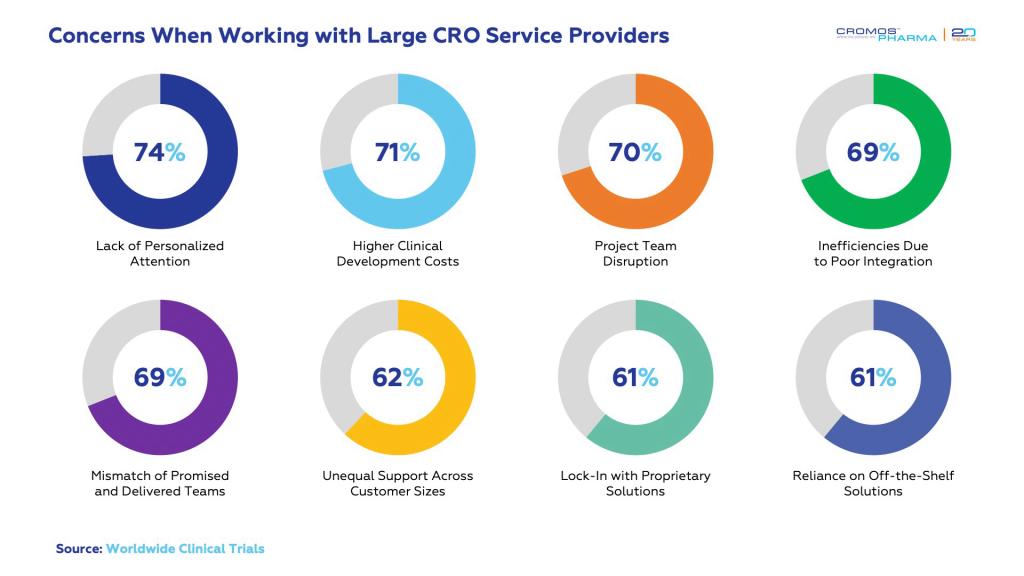
Unleashing Biotech Success: Why Smaller CROs Are the Key to Big Wins
In the fast-paced biotech industry, every strategic decision can have lasting impacts, and selecting the right Contract Research Organization (CRO) is one of the most critical. A notable shift has emerged, with many sponsors now favoring smaller and mid-sized CROs over their larger global counterparts.
Projections indicate that the market for CROs is set to grow substantially, potentially reaching around $90.9 billion by 2026. Currently, small and mid-sized CROs command approximately 44% of the market share in the clinical trials sector, demonstrating their significant appeal and relevance. Furthermore, industry forecasts suggest a promising 5% growth in market share for mid-sized CROs in the next three years. This trend is underscored by findings from the Worldwide Clinical Trials Survey, which involved 140 key decision-makers from emerging, small, midsize, and large pharma and biotech companies, revealing that 80% of respondents prefer smaller CROs.
Despite the global reach and extensive resources of larger CROs, many biotech firms find that smaller CROs often deliver superior value. This growing preference is opening significant opportunities for mid-sized CROs to expand their market presence and capitalize on the shifting dynamics within the industry.

As the biotech sector continues to evolve, the shift towards smaller CROs highlights a strategic alignment with the industry’s need for agility and personalized service. Let’s delve into the specific advantages that make small CROs indispensable partners for biotech companies.
Personalized Attention and Top Talent: Your A-Team Every Time
Large CROs typically reserve their “A teams” — their most experienced and skilled professionals — for large pharmaceutical clients, potentially relegating smaller biotech companies to work with less experienced staff. This can lead to delays and inefficiencies in project management. On the other hand, smaller CROs prioritize providing personalized service, ensuring that their “A teams” are involved in every project, regardless of the company’s size.
This approach guarantees that all clients receive expert attention and support, which is crucial for the successful execution of clinical trials. For biotech companies evaluating their options, smaller CROs offer a compelling advantage by consistently deploying top-tier talent to ensure effective and efficient research and development outcomes.
Cost Efficiency and Transparent Pricing: No Hidden Fees
One common issue with large CROs is the discrepancy between initial cost estimates and final invoices. Hidden fees and unforeseen expenses can inflate the cost well beyond the initial promise. Smaller CROs, with their leaner structures, typically offer more transparent and predictable pricing. According to a survey, smaller CROs often provide more cost-effective solutions, helping biotech firms stay within budget.
Agile and Adaptable Timelines: Speed and Flexibility
In the dynamic field of biotech, flexibility is crucial. Large CROs often operate with rigid timelines and bureaucratic processes that can stifle innovation and slow progress. A report highlighted that smaller CROs, being more agile, can adapt quickly to changes in project scope, regulatory requirements, or unforeseen challenges. This flexibility accelerates timelines and enhances the development process’s overall efficiency.
Accurate Patient Enrollment Projections: Hit Your Targets
Patient enrollment is a critical phase in clinical trials, and overestimating projections can lead to significant delays and additional costs. Despite their resources, big CROs often fall short in this area due to generalized strategies. Smaller CROs, with their niche expertise and localized knowledge, provide more realistic enrollment projections. Studies show that they achieve higher patient recruitment rates, meeting enrollment targets more reliably.
Enhanced Collaboration and Communication: Building True Partnerships
Working with a smaller CRO often means better communication and collaboration. With fewer bureaucratic layers, the team is more accessible, fostering a true partnership. Biotech sponsor always has a direct access to small CRO owners and real decision makers. This close-knit working relationship enhances problem-solving and innovation, leading to more effective development processes.
Cromos Pharma: Uniquely Offering Risk-Sharing Solutions
Cromos Pharma stands out in the CRO landscape not only through its agility, personalized attention, and operational efficiency but also by introducing a unique “No Patients – No Payment” risk-sharing model.
This distinctive offering ensures that sponsors are financially committed only when enrollment targets are successfully met, significantly reducing the financial risks associated with clinical trials. Rarely provided by other CROs, this model emphasizes Cromos Pharma’s commitment to reliable and economically sound partnerships. By merging these core advantages with an exceptional risk-sharing approach, Cromos Pharma offers more than standard services; it establishes a partnership that actively supports client success and reduces investment risks, thereby redefining industry standards in the competitive biotech landscape.
Think Small for Big Results: The Smart Choice for Biotech Success
For biotech companies aiming to navigate the complex landscape of clinical research, smaller CROs offer a compelling alternative to their larger counterparts. With personalized attention, cost efficiency, adaptable timelines, accurate patient enrollment, and enhanced collaboration, smaller CROs can be the secret weapon that drives biotech success. So, when it comes to choosing a CRO, think small for big results.






























